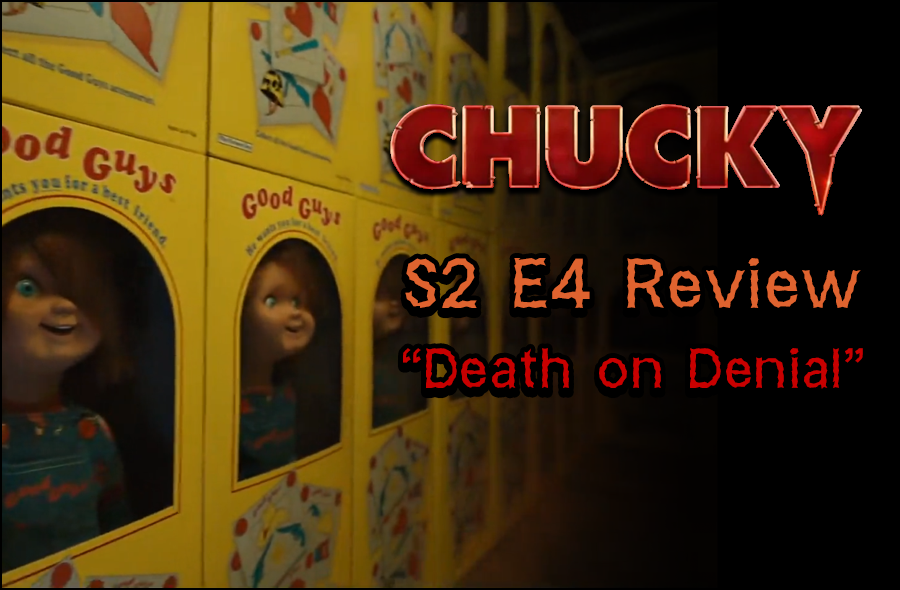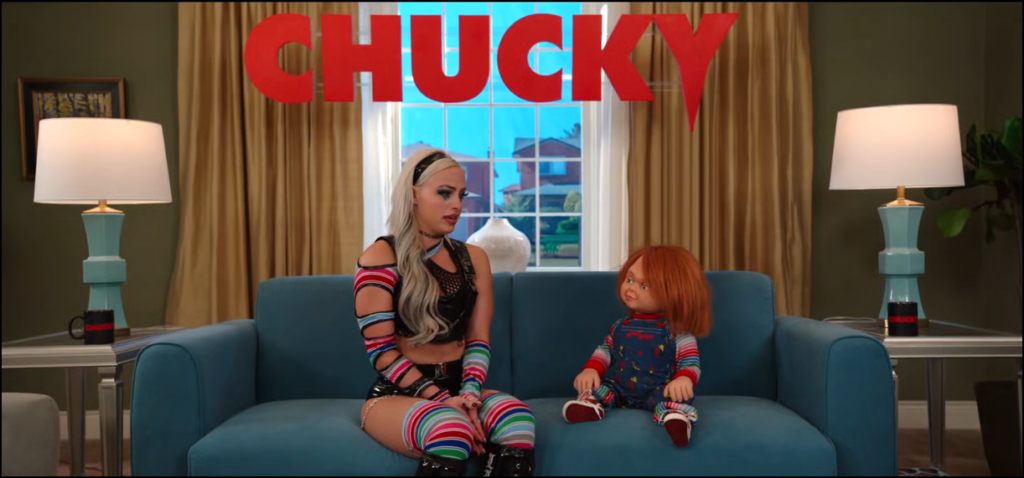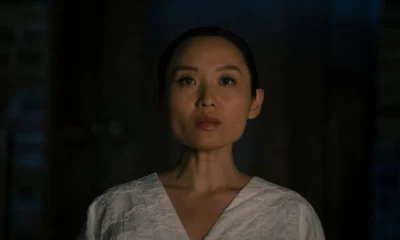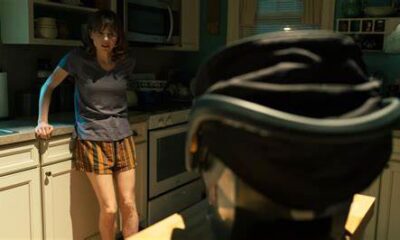
Chucky – S2 E4 – “Death on Denial”
We are back with Haunted MTL’s continuing coverage of the Chucky franchise. This week, we talk about Chucky S2 E4, “Death on Denial,” which presents a format break in the show and some of the wildest stuff seen this season.
Seriously. You’re not prepared for this week’s episode.
Chucky – S2 E4 – “Death on Denial”
Chucky, S2 E4, “Death on Denial” is a break in the established structure of the show to present a meta-humor murder-mystery farce. Plus, it opens with a talk-show-like wrap-around featuring Chucky. This episode is shockingly different for a show that has been more or less telling a fairly typically structured narrative. Right from the start, Chucky introduces the show in a faux-talk show setting, establishing it as a very special episode. Chucky directly addressing the viewers is nothing new to the franchise. Doing so directly and to such a degree shows something different is going on here.
The episode’s narrative picks back up with Tiffany/Jennifer back in Beverly Hills following her murder of Detective Sam Gavin. Shortly after, Glen and Glenda (Lachlan Watson, The Chilling Adventures of Sabrina) arrive for their 18th birthday (more on this at the end of the review). However, Tiffany/Jennifer’s plans for a small birthday gathering are disrupted when Glen and Glenda invite Jennifer Tilly’s real-life and reel-life friends. With this in mind, Tiffany/Jennifer hires help to guard a room in the house. However, when there is a shocking murder and everyone in the place is a suspect.
The episode’s central question is how much does anyone know about Jennifer Tilly? “Death on Denial” is a wild episode. It presents a break in the series format and swaps out the chaos of Chucky for a parlor-room murder mystery. The episode features Tiffany/Jennifer, Glen and Glenda, and real-life friends of Jennifer Tilly: Joe Pantoliano (Bound), Sutton Stracke (The Real Housewives of Beverly Hills), Gina Gershon (Bound), and Jennifer Tilly’s sister, Meg Tilly (Psycho II). Also, WWE Superstar Liv Morgan appears in a genre-blending Chucky-hosted wrap-around.

How Was It?
“Death on Denial” is probably the biggest, weirdest, swing-for-the-fences episode in the show so far. It even blows far past last week’s episode in that regard. If you thought a Good Chucky and a Swole Chucky were strange – an improvised murder-mystery party of a possessed actress and her real-life friends is certainly something that will catch most viewers off guard. I don’t think anyone, but Don Mancini could have directed this episode and been so successful in that regard. Everything from the act-signaling title cards to the non-linear structure to the wrap-around reflects his bold approach to the franchise in Seed of Chucky and beyond.
With that said, as fun as the episode is for someone like me who appreciates the weirdness and compartmentalizes the format break, this will be a divisive episode. Instead of continuing the threads of last week’s episode, we spend an hour at a farcical Beverly Hills birthday party that spirals out of control. We spend time with a wrestler, a reality-television star, four acclaimed actors, and three playing versions of themselves as the worst people imaginable, and it is hilarious. It’s an even campier Clue if you believe that possible.
Episode Highlights
Viewers and critics should pay extra attention to non-binary actor Lachlan Watson who steps into the roles of Glen and Glenda with confidence. The whole episode is full of Seed of Chucky references, down to eye-twitches and British accents on their part. Watson also pulls off the challenging prospect of making Glen and Glenda different characters while being part of an obvious split, unified personality. They also look great while doing it. The costume direction is fantastic and helps sell the differences in Watson’s take on the two kids.
The revelation of Nica’s long-term plan and how the fractured personality fits into the situation is also excellent, creating an explosive final 10 minutes. That 10 minutes also confirms the fate of a character who vanished in season one and opens up many narrative possibilities.
It’s hard to talk about this episode without running the risk of spoiling it, so some of these thoughts are best saved for my podcast. I wouldn’t suggest this as an episode for someone new to the franchise; it would be far too confusing. “Death on Denial” is a meta-heavy episode and every bit as ridiculous and hilarious as a “meta-heavy Chucky” episode would imply.
 (5 / 5)
(5 / 5)
Chucky – S2 E4 – Kill Count and Spotlight
Three new corpses pile up in this week’s episode, bringing the season total to eight. This week we have a poisoning, a shooting, and multiple stabbing. The stabbing is probably the most fun of the three, especially given the context and enthused joy expressed by both victim and perpetrator.
Again, this is a weird episode.
Seeds of Chucky
As always, each review features some notes on references and continuity in the whole Chucky franchise.
- Glen and Glenda’s age is a little complicated. Glen, as a singular entity, was born in 1998 during the events of Bride of Chucky. Glen and Glenda are a soul split into twins birthed by Jennifer Tilly in Seed of Chucky. The Valentine/Ray/Tilly family considers 2004 to be their actual birth.
- Chucky’s “affectionate” use of “Shitface” returns, contrasting Tiffany’s iconic “Sweetface.”
- The whole episode owes a lot to the murder mystery genre, but two significant influences up front are Clue (1985) and Agatha Christie’s novels.
- Regarding Clue: characters in this Chucky whodunit have color-based outfits that evoke those of the characters in the film and board game.
- Memory issues seem to be running with split souls. Glenda mentions a nightmare about killing a blond woman. Said woman is Joan from Seed of Chucky. Meanwhile, Tiffany/Jennifer doesn’t remember details about Meg and forgets Dianne Weist’s name and calls her Dianne West.
- Tiffany/Jennifer complains about losing an oscar to Dianne Weist in reference to the 1994 film Bullets Over Broadway.
- Far too many Bound references to convey here. The entire scene with Tiffany and Gina in a darkened bedroom features images pulled nearly directly from Bound. Specifically, a shot of the lips of the two women.
- The same trophy used to bludgeon someone in this episode is the one used to bludgeon Redman in Seed of Chucky.
- This is the first episode of the series not to feature Jake, Devon, and Lexi since their introduction.
- A certain… attachment to a character may reference the Evil Dead franchise.
That is the review and recap for this week. We’re continuing to cover the show at Kids’ Stuff – A Chucky Podcast. However, unlike these written reviews, our discussion show contains plenty of spoilers. If you missed the latest Kids’ Stuff, you could listen to it wherever you get your podcasts.
Movies n TV
Wheel of Time A Question of Crimson Is a Political Espionage Delight
Episode two of Wheel of Time felt like the beginning of a long journey. Stories are unfolding, lives are changing, and blood is spilling.
Let’s discuss.
The story
We begin this episode in the past with Elayne’s mother, Queen Morgase. It turns out her rise to the throne was a bit, shall we say, cutthroat. So when she shows up at the White Tower, Siuan is concerned.
She might have reason to be, too.
Meanwhile, Rand, Egwene, Moiraine, Lan and Aviendha are in the Spine of The World. As they travel through some of the most breathtaking lands I have ever seen on a TV show, Egwene is plagued with nightmares. We think at first that’s just her trauma working itself through her system. But we soon find out that it might not be that straightforward.
Finally, Perrin returns home to heal after his hand is almost cut in half. But when he gets there he finds the town has been infested by Children of The Light. And they’re looking for him.
What worked
There was something heartwarming in this episode about political espionage and choking religious persecution. And that is Elayne’s relationship with her family.
I have consumed a lot of fantasy content with royal families. And I have never once heard a princess call her mother ‘Mum’. I’ve never seen royal siblings get along. And I have sure as hell never seen a princess have a good relationship with her step-parent.
This was refreshing. Even though Queen Morgase is kind of a horrible person she seems like a good mother. And that’s an unexpected delight.

Of course, this is just one storyline among many. And while this can sometimes be overwhelming, in this case it wasn’t.
I’ll be honest, some of these storylines are going to drag for me. I know this because I’ve read some of the Wheel of Time books and I have an idea that not all the characters exactly pique my interest.
No one likes all the characters. No one likes all the storylines. While I am here for the political espionage between Queen Morgase and Siuan, not everyone likes it. While others might be fascinated with Selene trying to win Rand back, I couldn’t care less.
Having multiple storylines keeps everyone’s attention better. So long as things don’t get out of hand. Things can easily get out of hand. But this seems to be managed well.
So far.
What didn’t work
As I mentioned above, I’m not thrilled with Rand’s story at this point. And while it’s fine to not like a storyline when there are this many to choose from, it’s not fantastic that the one I like the least is the one involving our two main characters. And anytime we were with the team at the Spine of The World, the only thing that brought me joy was Moirain’s hat. It reminded me of Stockard Channing’s hat in Practical Magic.
The problem is that Rand is Charlie Brown with controversial magical powers. He is boring, serious, and pessimistic.
And yes, I understand that he has a heavy emotional burden and he’s the Dragon Reborn and that’s quite taxing and all. But let’s be fair, there isn’t a single person in this show that doesn’t have a heavy burden. And most of them manage to be fun occasionally.

All that being said, this episode of Wheel of Time did exactly what it needed to do. It set up conflicts at each of the three locations. It established emotional ties between the characters and the events. And it established goals for everyone.
This was, in short, a solid episode. Not groundbreaking, not mind-blowing or life changing. It was simply good. It was entertaining and moved the plot forward.
Well done.
 (3.5 / 5)
(3.5 / 5)
Movies n TV
Wheel of Time Returns With A Bang
Wheel of Time is back for season three. There are mixed feelings regarding this. Last season, there were some serious pacing issues. And some serious sticking to the book’s storyline issues. But we’re two seasons in, and we don’t give up so easily. So let’s dive into episode one, To Race the Shadow.
By the way, I highly recommend watching this episode with the subtitles on. You’ll see why.
The story
We begin this episode with Liandrin facing a trial of sorts for her rampant betrayal. She does her best to gaslight her Aes Sedai sisters into thinking that Siuan Sanche is the real traitor.

When that doesn’t work, she reveals how many Black Aes Sedai have actually infiltrated the tower.
Spoiler, it’s a lot.
In the aftermath, our whole team gathers to drink and enjoy one night of relaxation before they head out to the Tear to form an army for Rand. All is going well until they’re attacked by myriad creatures and a sentient axe.
What worked
This episode was long. It had a run time of an hour and eleven minutes. And a lot of that run time was spent in heavy dialog scenes.
Fortunately, these were well-done scenes.
If you’re going to have a lot of talking scenes, there are good ways and bad ways to do it. Last season, we saw lots of examples of the bad way to do it. But this episode did it well. For one thing, other things were going on while conversations were taking place. The characters are drinking, playing games, walking through an interesting city. And the scenes themselves didn’t stretch out. They weren’t repetitive. We heard what the character had to say, then we moved on.
It was also nice that the point of these scenes wasn’t just info dumps. We had character development. We had romantic interactions. We had plot development and foreshadowing.
Overall, this episode felt like what it was. A moment of calm before a storm.
Taking a step back, I’d be remiss if I didn’t address the fight scene at the start of the episode. Because it was epic.
The magic looked amazing. The martial arts that went along with it looked fantastic. The costumes were beautiful. It was just incredibly fun to watch.
More than that, it was emotional. We lost some characters in that fight that were important. And it was clearly emotionally shattering for many of our characters, who found themselves betrayed by people they trusted.
So many of them.
It was a great way to open the season.
What didn’t work
Despite that, this episode wasn’t without its flaws.
First off, there were a lot of dialog scenes. And they were good scenes, as I’ve already discussed. But it was one after another after another. And when your episode is, again, an hour and eleven minutes, it’s maybe a little much to have so much chit-chat. Couldn’t some of these conversations, important as they were, have been moved to maybe another episode?
Finally, I want to talk about Egwene’s travel through the arches.

I feel like maybe there were some deleted scenes here. Because there must have been more to that visit than what we saw, right?
We could have seen Egwene battle Rand. That would have been badass and emotionally devastating. We could have seen her with a quiet life with Rand back home at the Two Rivers. We could have seen anything except for the quick clip of Rand in a bloody river, followed by Egwene being shoved back out in a bloody shift.
No products found.
Bad job. But at least it wasn’t an extended scene of Moiraine collecting bathwater, and then taking a bath while looking sad. If we’d started this season with another scene like that, it might have broken my brain.
Amazon dropped the first three episodes at once. So we’ll be back soon to talk about episode two. See you then.
 (4 / 5)
(4 / 5)
Movies n TV
Entertaining as hell: Eight Legged Freaks (2002) Review
Early 2000s is a special era for the industry. It accepts the cheesiness and corniness of movie making, in turn producing some gems in their own right. Eight Legged Freaks starring David Arquette and young Scarlet Johanson is a horror comedy about giant spiders who overtake a small town. As crazy as that premise sounds, the movie surprisingly has a ton of heart and is super entertaining. Let’s review, shall we?
Plot
We start Eight Legged Freaks with a shot of toxic waste spilling into the water supply of Joshua, a spider farm owner. He is friends with Mike, one of our protagonists, who is a science geek and a spider enthusiast. Mike notices something quite right upon visiting Joshua, but no one takes him seriously. We are then introduced to the rest of the crew. Mike’s mother Samantha, the town sheriff, is too busy chasing Ashley, his sister, who is dating the town mayor’s son Bret (something Samantha does not approve of). We also have Chris, who returns to the town to save his father’s legacy in the town mines. He has opposition from Wade, Bret’s father, who wants to use the mines for his business ventures. Lots of drama going on that will only get juicier once the spiders get loose.
The creepy crawlies quickly dispose of Joshua and make their grand appearance after Ashley rejects Bret’s advances, abandoning him in the middle of a desert. A glorious chase sequence ensues as the spiders make their way towards the town, wreaking havoc on its residents. In a true horror fashion (which the movie acknowledges), it takes some convincing from Mike and then from Samantha for the town to take the threat seriously. The tongue-in-cheek style of narrative adds the comedy aspect to a movie that would otherwise burn out fairly quickly.
The remaining characters hide out in a shopping mall as it’s the only somewhat sturdy building in the area. This doesn’t last long as the spiders break in, forcing them to run through the mines. Their resources to fight the creepy crawlies off are limited as the methane gas doesn’t allow them to use firearms. Such conditions require resourceful thinking from Chris, who uses perfume to fend off the leader of the spider group and save himself during the climax of the movie.
Character dynamics are not forgotten once the action kicks in. We have Chris confessing his long-term feelings for Samantha which she knew all along, which provided some comedic relief. Bret also reunites with Ashley and apologises for being an asshole. Mike finally gets the appreciation he deserves as his knowledge saves the townsfolk more than once during the whole ordeal.
We end the movie with the town’s radio show person telling the story as an urban legend during his segment. This brings it into question – how much of it happened the way he said it did? We can only guess…
Overall thoughts
Eight Legged Freaks is a fun creature feature with some self-aware commentary on genre tropes that doesn’t take itself too seriously. The acting is good, the pacing fitting and the characters are likeable enough for you to want them to make it through. Definitely a must watch, if you don’t suffer from arachnophobia, that is.
 (5 / 5)
(5 / 5)
- What do you get when you cross toxic waste with a bunch of exotic spiders? Eaten! The townies of Prosperity, Arizona will all become a screaming smorgasbord if mutated arachnids as big as SUVs have their way in this comedy/horror crowd pleaser whose creators include the producers of Independence Day and Godzilla
- Spiders that leap like gazelles, web-spitting spiders, spiders that suck your insides out as if through a straw—they’re all among the behemoths conjured up by an inventive effects team
- David Arquette (Scream) leads the two-legged stars, mobilizing the citizenry in a last-ditch fight to survive
Last update on 2025-03-10 / Affiliate links / Images from Amazon Product Advertising API













